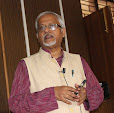
Ganga water, flowers and Tulsi leaves were offered as royal gifts to mark the beginning of Akbar’s Fort in Allahabad. His Hindu wife, Jodhabai, had strong influence on him. We revisit the Akbar-Jodha controversy, serialising the fort story.
CJ: Arindam Roy, 19 Feb 2008 Views: 1968 Comments:0
IT WAS in the scorching heat of June 9, in 1567, that a battle-weary emperor, after crushing rebellion, had marched to Allahabad. He rested for two days. He realised the strategic importance of the city and had decided to build a fort here. He was the great Moghul emperor, Akbar.
There were turmoil, rebellion and uprisings till 1580. Battles were fought. In those turbulent times, the foundation of Akbar’s Fort, better known as Allahabad Fort, was laid, in 1575, according to the Muslim recorder Badaoni. That was also the year when the foundation of the city was laid. It was called Ilahabas. However, Nizam-u-Din Ahmad, author of Tabaqut-i-Akbari dates it nine years later, in 1584, in his book. The emperor had commanded that a fort and city be built at Prayag, under the name Ilahabas. From here, Akbar went to Agra, where he spent four months.
Yet another story in circulation states that Akbar spent some time in Ilahabas, on his way to Bengal, to crush the revolt of 1580. Many kings paid homage and lavish gifts to the Emperor. The Raja (king) of Jhusi too had been invited. But, his income was paltry. He called his minister, the legendary Birbal and said that Akbar should be told that the king was ill. The witty minister heard the Raja’s story and asked him to forget his worry. He observed the Emperor and noticed that he behaved like a Hindu. Birbal found out that Akbar’s Hindu wife Jodhabai (Man Singh’s sister) had tremendous influence on him.
The following day, Birbal got a silver sledge and hammer, some Ganga sand on a silver plate. He also took some Ganga water, flowers and Tulsi leaves. The Raja accompanied Birbal and visited Akbar. After the Raja left, the gifts were opened, in the presence of Birbal. Akbar was annoyed. Birbal swung into a damage control exercise. He explained that his Raja wanted Akbar to build a memorial at the holy place. The gifts included symbolic implements for laying the foundation and performing the ‘puja’ (worship). Akbar was pleased with Birbal’s explanation.
Next morning, Akbar ordered that the various gifts that were given to him by various kings, be handed over to the Raja of Jhusi, so that he could get the fort built. More money was sent from Delhi. The fort was constructed by the Raja, under the able supervision of Birbal.
It was the foresight of Birbal that he changed the course of Ganga, by constructing Triveni bund, with a view to save the fort and to ensure that the Raja’s residence in not too close to the Emperor’s fort. Later, Akbar ordered Birbal to accompany him to Delhi.
The Allahabad Fort, built on the necessity of military compulsions, was to remain under military occupancy. After Akbar, the fort was under several rulers. During the British regime, General Kyd was its commandant. The locality Kydganj was named after him. The Britishers had converted it into a modern stronghold by the year 1938. Irreparable damage was caused to its architecture, be several rulers, particularly the English. After, independence, the legacy of military occupancy continued.
(Link: http://www.merinews.com/catFull.jsp?articleID=130349 )












This kind of visual storytelling brings history alive - really enjoyed reading this.
ReplyDeleteThanks Joyce for your encouraging comment :)
ReplyDeletereal history. Why did he want to name Prayag Ilahabas? Any significance in the name? Wondered how Jodha agreed to the name change of Prayag to Ilahabas.
ReplyDeleteNow you have me hooked to the story. Will read this tonight...all of it before I go to bed.
Yes, Shoma, it was well though out. Akbar's secularism germinated here, at the banks of Ganga and Yamuna. Ila is the daughter of Moon - a name that appeased the large Hindu population. Ila waas - the abode of Ila. And it meant Ilaha (Allah, Ilaha, Illalah) for the Muslims. Over a period of time, it corrupted to Allahabad - its present name.
ReplyDeleteIt is so strange that secularism in India is so well-woven in the mesh of the society, yet at the slightest provocation of the politicians, the whole atmosphere take such a crimson hue. Enjoyed it very much :)
ReplyDeleteThat's right, Anumita. As we move forward, I feel the sociopolitical atmosphere is becoming vitiated and obfuscating. The carbuncle of caste and community is shredding us. I feel, the polity and the politicians are together responsible for the present state of affairs. Indianness is all about inclusion, whether it was the Vedic Rishis or Akbar, much later.
ReplyDeleteThanks a lot for your kind words :)